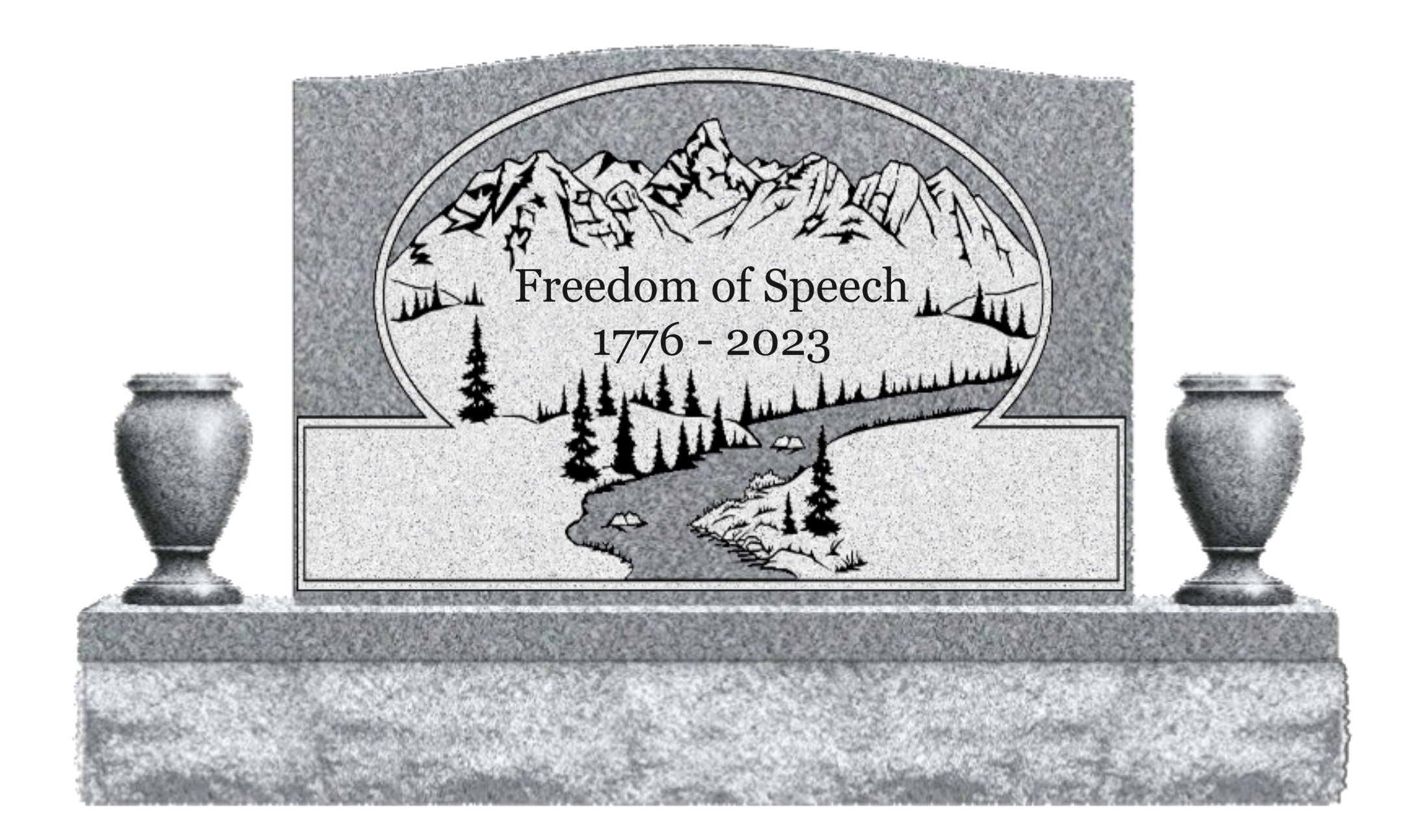The Impact of Political Correctness on Free Speech
Political correctness has become a highly debated topic in recent years, particularly in the context of social media and college campuses. While the stated intention behind promoting “inclusive language” and creating “safe spaces” is to foster a more tolerant society, there is a growing concern that political correctness is killing free speech. Lets explore the influence of political correctness on free speech, delving into its rise on liberally minded social media platforms and its impact on like minded college campuses. By examining the challenges and consequences of navigating free speech in an era of political correctness, we will strive to understand the delicate balance between promoting inclusivity and preserving the fundamental importance of open expression in a democratic society.
The Definition and Evolution of Political Correctness
Political correctness, or PC for short, has become a buzzword that seems to be everywhere these days. But what exactly does it mean? At its core, political correctness refers to the avoidance of language or actions that may be offensive or hurtful towards certain groups of people. While this may initially sound like a noble goal, the concept has evolved over time and taken on a dark life of its own.
Historical Political Correctness
Political correctness, was originated in communist Russia, it was a deeply ingrained and extensively enforced ideology that permeated all aspects of society. The Soviet regime utilized political correctness as a means to maintain control over the population and suppress any dissenting opinions or behaviors that could potentially challenge its authority. In this repressive environment, individuals were expected to adhere strictly to state-sanctioned language, beliefs, and behaviors. Non-conformity could result in severe consequences such as public shaming, loss of employment, or even imprisonment. By manipulating the narrative through politically correct language and propaganda, the government aimed to mold public opinion and create a homogenous society where divergent ideas were eradicated. This strict adherence to politically correct speech acted as a powerful tool for the communist regime in suppressing individualism and maintaining a pervasive atmosphere of conformity among the masses.
The Fundamental Importance of Free Speech in Society
Free speech is a cornerstone of any democratic society. It allows ideas to be exchanged, debates to be held, and progress to be made. It fosters innovation, challenges the status quo, and gives a voice to the marginalized. Without free speech, we risk becoming a society where conformity reigns and dissent is silenced. It is through the clash of ideas that we can truly grow and evolve as a society.
The Rise of Political Correctness on Social Media Platforms
The Influence of Social Media in Shaping Public Discourse
Social media has undoubtedly transformed the way we communicate and share information. It has the power to shape public discourse, mobilize movements, and give a voice to those who were previously unheard. However, it has also become a breeding ground for censorship and political correctness, where any deviation from the norm can result in backlash and public shaming.
The Role of Political Correctness in Online Censorship
While social media platforms claim to prioritize free speech, they often find themselves walking a tightrope between allowing diverse viewpoints and policing what the may percieve as offensive or harmful content, such as disenting ideolgies or ideas. This has led to a growing concern about online censorship, where contrary opinions or controversial ideas are silenced in the name of political correctness.
Political Correctness and its Influence on College Campuses
The Origins of Political Correctness in Academic Settings
College campuses have historically been thought to be a breeding ground for intellectual diversity and free thought. However, in recent years, they have become hotbeds for extreme liberal political correctness. This can be traced back to the origins of political correctness in academic settings, where certain ideas and perspectives are deemed unacceptable or offensive. Today, many college campuses are thought to be breeding ground for extreme left wing idologies with no tolerence for dissenting ideas.
The Proliferation of Safe Spaces and Trigger Warnings
One of the consequences of the rise of political correctness on college campuses is the proliferation of safe spaces and trigger warnings. While these concepts aim to create “inclusive” environments and protect students from potentially distressing content, they have also been widely criticized for stifling intellectual freedom and fostering a culture of hypersensitivity. In a sense creating a victim mentality in college students and not properly preparing them for the realities of life outside of academia.
The Challenges of Navigating Free Speech in an Era of Political Correctness
The Fine Line between Free Speech and Hate Speech
In an era of political correctness, it can be difficult to navigate the boundaries between free speech and what might be considered “hate speech”. While it is crucial to protect marginalized groups from discrimination and harm, we must also ensure that the right to express dissenting opinions is not stifled. Striking the right balance is a challenge that requires thoughtful consideration and open dialogue.
The Impact of “Cancel Culture” on Public Discourse
Another challenge posed by political correctness is the rise of “cancel culture,” where individuals or groups deemed to have made offensive or controversial statements are publicly shamed, boycotted, or even ostracized. While accountability is important, this trend has raised concerns about the erosion of open debate and the silencing of opposing viewpoints.
In conclusion, while the intentions behind political correctness may be noble, its impact on free speech cannot be ignored. As society continues to grapple with finding the right balance, it is crucial to foster an environment that allows for open dialogue, promotes critical thinking, and values the importance of diverse perspectives. After all, it is through the clash of ideas that we can truly learn, grow, and progress as a society. Let’s strive for a world where both free speech and empathy can coexist.
The Consequences of Suppressing Free Speech in Academic Settings
The Stifling Effect on Intellectual Diversity and Critical Thinking
When free speech is suppressed on college campuses, intellectual diversity takes a hit. Without a range of perspectives and ideas, students are deprived of the opportunity to engage in vigorous debate and critical thinking. Instead, they may find themselves in an echo chamber where their beliefs go unchallenged. This stifling effect can hinder intellectual growth and limit the development of well-rounded individuals.
The Diminished Role of Higher Education in Challenging Ideas
Colleges and universities have traditionally been seen as bastions of intellectual exploration, where challenging ideas are embraced. However, when political correctness dominates the discourse, these institutions may shy away from controversial topics altogether. The diminished role of higher education in challenging ideas not only limits students’ exposure to diverse perspectives but also undermines the very purpose of academia – to push boundaries and foster intellectual growth.
Balancing Free Speech and the Need for Inclusive Environments
Navigating the Conflict between Freedom of Expression and Harmful Speech
Balancing free speech and the need for inclusive environments is undoubtedly a challenge. While freedom of expression is essential for a healthy democratic society, it is also crucial to address the concerns of marginalized communities who may be disproportionately affected by harmful speech. Navigating this conflict requires thoughtful consideration and sensitivity to ensure that everyone’s voices are heard and respected.
Strategies for Fostering Inclusivity without Curtailing Free Speech
Finding ways to foster inclusivity while preserving free speech is possible. Rather than shutting down ideas we disagree with, it is important to engage in open dialogue and encourage respectful conversation. Creating spaces for constructive debates and actively seeking out diverse perspectives can help cultivate an environment where inclusivity and free speech coexist.
Strategies to Restore and Protect Free Speech on College Campuses
Promoting Open Dialogue and Civil Discourse
Restoring and protecting free speech on college campuses requires a commitment to promoting open dialogue and civil discourse. Encouraging students to engage in respectful debates, challenging their own beliefs, and listening to opposing viewpoints are crucial steps in fostering an environment where free speech can thrive.
The Importance of Academic Freedom and First Amendment Rights
Academic freedom and First Amendment rights are fundamental pillars of a thriving democracy. Protecting these rights on college campuses is vital to ensure that students and faculty have the freedom to express their thoughts, challenge existing norms, and contribute to the pursuit of knowledge.
The Importance of Preserving Free Speech
Striking the Balance between Respectful Communication and Open Expression
In a politically correct society, it is vital to strike a balance between respectful communication and open expression. Free speech should not be sacrificed at the altar of political correctness. By fostering an environment where diverse ideas are welcomed, intellectual growth can thrive, and society can ensure that the exchange of ideas remains a cornerstone of progress and understanding. Let’s embrace our differences, engage in respectful dialogue, and celebrate the richness that free speech brings to our college campuses and beyond.
In conclusion, while political correctness aims to create a more inclusive and respectful society, it is crucial to tread carefully and ensure that it does not hinder free speech. The ability to express diverse opinions, challenge established ideas, and engage in open dialogue is fundamental to intellectual growth and societal progress. Striking a balance between promoting inclusive environments and safeguarding the right to free expression is necessary to maintain a democratic society where ideas can be freely exchanged and critically examined. By embracing strategies that foster open dialogue and protect academic freedom, we can navigate through the challenges of political correctness and preserve the invaluable value of free speech in shaping our collective future.





